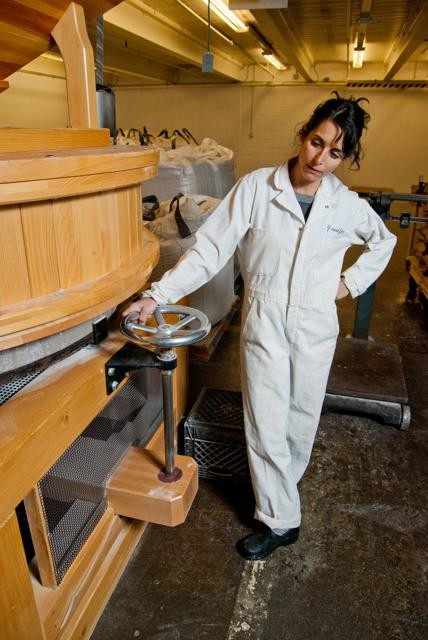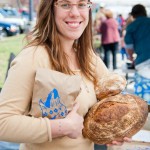- Jennifer Lapidus by Max Cooper
- David Bauer by Max Cooper
- Tara Jensen by Max Cooper
Within every loaf of bread, there's a message. Beneath the crust, spiraling glyphs of flour, salt, water and yeast tell a story of grain farms, millers and bakers.
For those unschooled in the alphabet of the crumb, bread's inner complexities resemble a web of caverns. Luckily, even the bread illiterate can taste the message.
Among bakers, these caverns are called “crumb structure.” “The crumb of your loaf really tells a story about where it comes from,” says Tara Jensen, who owns Smoke Signals Baking. “It's giving us information about our lives, our farms and our mills and environment.”
Jensen wants her bread to speak through texture and taste. She calls it “honest bread,” loaves that contain just four ingredients and have nothing to hide. At the West Asheville and downtown tailgate markets, Jensen sells several varieties of bread, each distinct from the others but made from nearly identical materials.
Flour variety creates the difference between loaves, and Jensen orders hers from Carolina Ground. The small, stone mill sources North Carolina grain from within 400-miles of Asheville and produces more than a dozen varieties of flour for Jensen’s experimentation. “This flour helped my bread strike a chord,” she says. “It gave it something to say, something substantial, flavor-wise, texture-wise.”
Celebrating its first birthday this spring, Carolina Ground is a relatively new resource for this region. It focuses on providing local flavor by grinding small orders of grain into thought-provoking flours. Ironically, it owes its existence to a global vortex of stock deals, abstract figures and commodity speculators.
Today, the business counters the ups and downs of the stock market by nurturing stable relationships between producers of grain, flour and bread. The team of bakers, millers, farmers and investors behind the mill considers local markets (such as those where Jensen sells her bread) as investments in the future.
The grain bust
David Bauer, who owns Farm & Sparrow Bakery and co-owns the forthcoming All Souls Pizza, remembers some of the worst bread he ever produced. The unpalatable loaves weren't amateur productions or experiments. They came from the thrashing of the national grain economy.
In 2008, a speculative, grain-buying free-for-all made wheat scarce, and what was available was shoddy. “You couldn't get good grain during that time,” Bauer says. “The bread was just dying on the hearth.”
Bauer wasn't the only baker struggling. Everyone who sourced grain or flour from commercial mills paid high prices for sub-par product until the speculative bubble burst. Prices tumbled, though they still haven't returned to their pre-2008 lows. “Everyone's bread was just deteriorated because we were all tied into that same network,” says Bauer, who also serves on the board of Carolina Ground. “The whole idea of working with farmers and growing wheat regionally came about during the wheat crisis.”
Well, most of that idea, anyway, explains Jennifer Lapidus, general manager of Carolina Ground. Scientists such as David Marshall at North Carolina State University had been studying methods for growing grain in North Carolina for several years before the price spikes. But the crisis was a call to action for anyone with a stake in grain.
In 2008, Lapidus owned Natural Bridge Bakery. “The thought of using local flour was not something I was willing to risk until it became clear how disconnected we were from our wheat,” she says. “[The crisis] was this perfect set of circumstances that made all the bakers go, 'Oh my gosh, we don't know where this is coming from, and we rely on it so heavily.'”
Smarting from the prices, a group of local bakers got together to brainstorm a way to protect themselves. “We literally pulled out chairs in a circle and talked about the sustainability piece, the concept, how inspiring it would be to be able to cut out the miles and know our farmers,” she says. “It was going to mean engaging on a different level with this product.”
In 2009, a group of bakers, researchers and nonprofits started the North Carolina Organic Bread Flour Project, which would eventually launch the mill.
The seesaw effect
During the months that bakers were suffering from high prices and low quality, Billy Carter was feeling optimistic. He'd been farming for about 30 years in Eagle Springs, between Charlotte and Fayetteville. Before 2008, he grew conventional grain as part of his crop rotation and sold it cheaply as animal feed. “Millers in general were on the top side of that equation,” he says. “They had really no need to have much discussion with growers because what was in the marketplace was so readily available and inexpensive.”
When the economy turned, Carter and other small farmers noticed an opportunity to break into the organic grain market. Suddenly, because grain was scarce, marketing was easier. Carter grew his first crop of organic wheat in 2009. He sells some of it to a commercial mill, but the rest goes to Carolina Ground. “It's nice to be able to reach some level of equilibrium,” he says. “I think Carolina Ground is looking at trying to find a place where both of us can make money.”
This year, Carolina Ground is actually paying a little more than a commercial mill. “We're just trying to take care of each other and do what's fair in really direct relationships, no chasing the highs or lows, but hoping for very consistent pricing,” Lapidus says.
Farmers get a little more than money from the mill. By testing for quality, the mill recognizes especially good grain. That recognition is rewarding, Carter explains. “Even though you don't have a tremendous amount of control over it,” he says. “It's still nice, when you do have that superior product, that it's recognized.”
Balanced on a grain of wheat
For bakers like Jensen, who works at the mill a couple of days a week and bakes exclusively with Carolina Ground products, Carter’s grain is an expressive force. “I view the bakery as an artistic project that's turning into a business,” says Jensen, who is also an installation artist.
Jensen started Smoke Signals in 2012. She understood the industry’s troubled past, and the importance of adaptation. “It excites me as a baker to work within a set of restrictions because then it's a test of me and my skills to see what I can create,” she says.
She's finding ways to work with constraints imposed by banks and rents — for example, she shares an oven with Papa Nick's Pizza in Mars Hill, baking for market after the restaurant closes.
She doesn't sleep much on nights before the markets, she admits, but she keeps her overhead low. “I've developed relationships with my community, like with the woman who lets me use the oven. That never would have existed if I just went out and bought every single thing that I need,” she says. “It keeps me conscious of the other relationships that have to be in place for the bakery to exist.”
Daily bread for the days ahead
Like the bakers it supplies, Carolina Ground is focused on long-term growth and adaptation. Lapidus and her crew have spent the past year exploring the business' potential. They're learning as they go, Lapidus explains, testing the characteristics of different plants and figuring out how to market the idiosyncratic flours.
In its first year, the mill has received some support from the nonprofit Carolina Farm Stewardship Association, but Lapidus is adamant about the future: The mill will run as a self-sufficient business, a mission-driven for-profit. “I am not looking for more grants even if you see me waitressing,” she says. “I definitely feel like we need more for-profits and less nonprofits working on sustainable things.”
The mill needs to cover its bills to provide a reliable service for the farmers, bakers and employees, she explains. “The idea isn't that we should have a sustainable food system that needs to be propped up by grants,” she says. “The idea is that we should be able to sustain it as a community, as a society.”
With these goals in mind, Carolina Ground is gaining regional accounts by hooking up with small distributors in Charlotte, Raleigh and Atlanta. Its new website will help spread its flour (and an expanding product list) across the nation.
The mill is experimenting with other crops, including buckwheat. The more plants it can process, the more useful the relationships between the farmers and the millers, and the more profitable the project will be, Lapidus says. She hopes to equip the mill to process beans.
Lapidus doesn’t know what the grain market of the future will hold, but she’s confident that, going into its second year, the mill is grounded in a solid base. “One of the coolest things about this project is that bread is so symbolic, the staff of life,” she says. “It was all built on this staple of our daily bread.”







Before you comment
The comments section is here to provide a platform for civil dialogue on the issues we face together as a local community. Xpress is committed to offering this platform for all voices, but when the tone of the discussion gets nasty or strays off topic, we believe many people choose not to participate. Xpress editors are determined to moderate comments to ensure a constructive interchange is maintained. All comments judged not to be in keeping with the spirit of civil discourse will be removed and repeat violators will be banned. See here for our terms of service. Thank you for being part of this effort to promote respectful discussion.